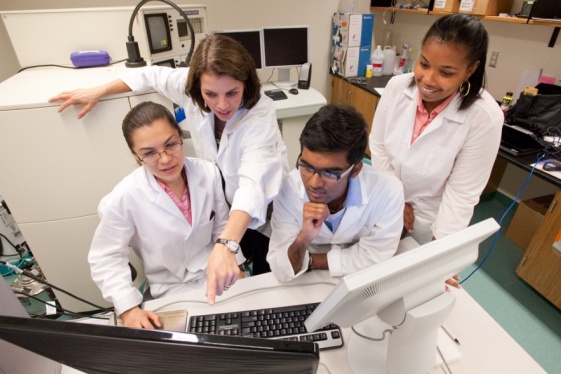
The UMass BTP program is committed to diversity, equity, and inclusion for students in the program, faculty members, and staff. We recognize that the best biotechnology comes from diverse groups of scientists and engineers that bring their unique perspectives toward a common goal. Our program prides itself on being a highly interactive and inclusive group that fosters excellent BTP training and research, with specific guidelines and actions listed further below.
DIVERSITY
- All BTP labs are involved in training undergraduate and/or graduate students from groups that are underrepresented in STEM, and many BTP program members and alumni are themselves from groups that are traditionally underrepresented in STEM.
- Although a relatively new NIH T32-funded program with only four alumni thus far, three of our alumni are women. The declarations below reflect our commitment to continue striving for a more diverse and inclusive training program.
- The BTP program commits to having a team with faculty and student representatives from the BTP program every year at the following minority-serving conferences: NOBCChE, SACNAS, ABRCMS, and SHPE. More conferences are potentially of interest and could be added to this list in future years. The BTP program will use available funds to support student and faculty travel to these conferences, in conjunction with the Graduate School, the participating colleges and programs/departments, and the Provost’s office. The BTP pledges to financially support any and all faculty members, staff, and students who wish to attend any of these conferences that are not covered by these other sources and/or travel awards.
- The Graduate School will waive the application fees for any students from URM groups applying to graduate programs at UMass. If you are interested in joining a graduate program affiliated with BTP and want to request a fee waiver, please contact btpassist@umass.edu. Participating programs are any of those in the College of Natural Sciences and the College of Engineering
EQUITY
- UMass is a destination of choice for students from underrepresented groups to pursue graduate education in STEM disciplines with a number of programs designed to foster success, such as:
- The Institute of Diversity Sciences hosts research groups on three topics—learning, health, and climate change—as they relate to STEM and equity.
- The NIH PREP program funds a one-year post-baccalaureate internships bridge to graduate school.
- UMass Amherst is a participant in NEAGEP, which provides a robust mentoring network.
- Disability Services is committed to full access for all persons at UMass Amherst, and promotes the empowerment of people with disabilities and their full integration into campus life and the community.
- The Graduate School at the University of Massachusetts Amherst is part of the National Research Mentoring Network. BTP faculty members all receive training by this program. New faculty members that join the program will have one year to complete this training after entering the training faculty. The BTP Program PI will work with the DEI committee to ensure that all students receive appropriate mentoring.
- The BTP DEI committee members will serve a 2-year term, with the option to renew. The committee’s tasks are to:
- Coordinate Recruiting Efforts of students from (URM) groups and students with disabilities in STEM disciplines.
- Coordinate with the PREP program.
- Plan and run the Annual “Promote Yourself Event”, which encourages students of all backgrounds to apply to and attend recruiting events including SACNAS/ABRCAMS/NOBCChE and DREAM/Emerging Researchers National (ERN)/AHEAD conferences.
- Assign mentors and oversee the Multi-Tier Mentoring Program for graduate students, designed to improve inclusion of individuals from all backgrounds.
- Update the DEI website, here, with new initiatives as they are formed.
- Members for 2019-2021: Shelly Peyton, Greg Tew, Sovann-Malis Leong, Sibongile Mafu, Juan Jiménez, Jen McDermott, Danny McSweeney, Linda Ziegenbein, Jesse Mager, Neha Gupta, and Paula Rees.
INCLUSION
- The benefits of BTP training are available to all UMass graduate students who would like to participate, regardless of their funding status.
- All members of the BTP program are expected to treat everyone, regardless of background, with respect.
- Through a combination of NIH funding and matching funds provided by UMass, BTP Traineeships are available to both US and international students.
- The DEI committee will regularly host DEI discussions and seminars on DEI-related topics. This includes an annual town-hall where the committee can obtain feedback on how our BTP efforts are improving diversity, equity, and inclusion in the community.
Looking for other resources on diversity, equity, and inclusion? Check out:
Scientists think that because they can be objective in one realm, they are objective in all realms.
To reduce biases, acknowledge them
The Untapped Genius That Could Change Science for the Better
Neurodiversity as a Competitive Advantage
BTP members have also put together a reading list that you might find useful:
Superior: The Return of Race Science by Angela Saini
A More Perfect Reunion by Calvin Baker
Thinking Race by Richard Goldsby & Mary Catherine Bateson
So You Want to Talk About Race by Ijeoma Oluo
White Fragility by Robin Diangelo
Between the World and Me by Ta-Nehisi Coates
Just Mercy by Bryan Stevenson
How to be an Anti-Racist, Ibrahim X. Kendi
White Rage by Carol Anderson
Killing the Black Body by Dorothy Roberts
This page was written by the BTP Diversity, Equity, and Inclusion (DEI) committee and approved by the BTP Executive Committee.
